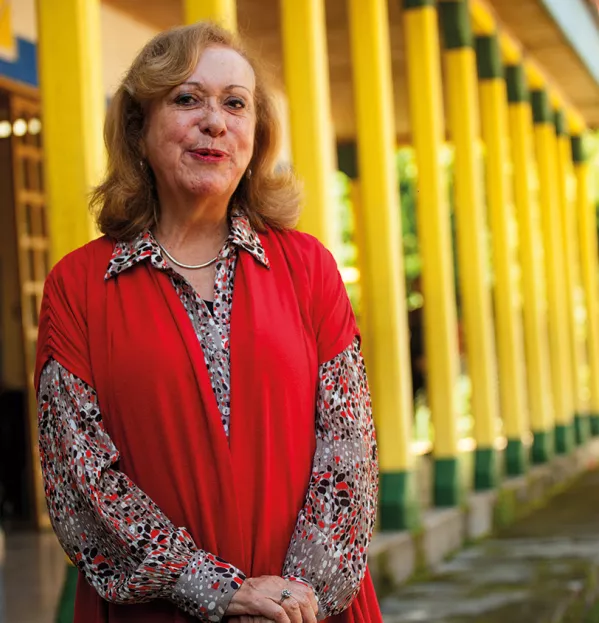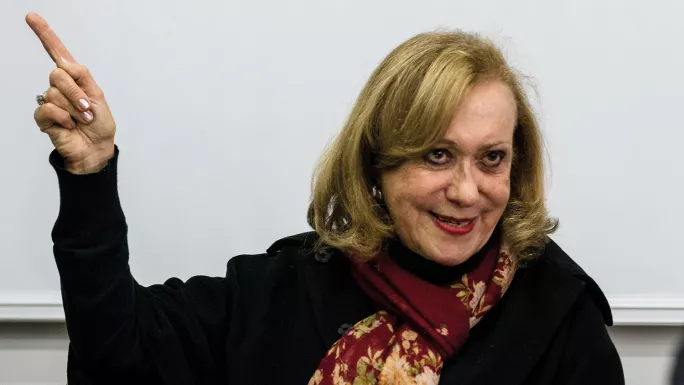
‘A teacher cannot continue being the centre of the transmission’

Images of a communist revolutionary, the leader of the Catholic Church and an American president adorn the walls of Vicky Colbert’s office.
Fidel Castro, John Paul II and Bill Clinton may be an unlikely combination, but the framed photographs that record their meetings with the Colombian educationalist hint at the scale of her influence and ambition.
Her Escuela Nueva movement, known in English as New School, has brought a low-cost, simple and high-quality primary education to thousands of remote, rural communities in developing countries - often in a single classroom containing children of many different ages.
It is now also seen as a model that could help refugee children in the UK. But, more broadly, Colbert believes it embodies a new paradigm of teaching that is vital to address the challenges of the 21st century.
However, unlike the teaching approaches favoured by the current UK government, Escuela Nueva is proudly progressive, building on the child-centred approaches of pioneers such as John Dewey and Maria Montessori.
Pupils teach each other in groups and pairs, using detailed learning guides that allow them to learn at their own pace - something that matters in areas where farming duties can dictate when a child is able to attend school.
Families and the local community are actively involved in the child’s education. There is an emphasis on using cooperative approaches in the classroom to nurture peaceful and democratic instincts, of particular relevance to a country still emerging from decades of civil war.

Speaking with a passion that is undimmed more than four decades into her vocation, Colbert says the world needs “a new role for the teacher in the 21st century”. Although her education model was designed to help pupils in developing countries, she believes its philosophy can be applied more universally.
Colbert believes that jobs being created in the future will require skills such as cooperation and leadership, which is best developed by helping children to discover knowledge for themselves through group and pair work, rather than being given it by the teacher.
She says: “A teacher cannot continue being the centre of the transmission of information. We are going for a change in the paradigm of education. We are going from transmission of knowledge to the social construction of knowledge, so it’s promoting more childcentred learning - not everyone learns the same thing at the same time - and different learning rhythms and constructing knowledge together through dialogue and interaction.”
This talk is anathema to figures such as schools standards minister Nick Gibb, who deplores child-centred approaches and evangelises for direct instruction from teachers.
With a wave of her hand, Colbert dismisses Gibb’s arguments as “silly, because that’s the way children learn”.
The minister’s preferred “teacher-centred” methods belong in the past, she suggests. “It’s going back so many years,” she says.
Colbert was born in Oregon, USA, to a US Navy officer, who died when she was a baby, and a Colombian mother, who founded several teachers’ colleges in Colombia. She grew up in Bogota and was privately educated in Colombia and the United States.
“I was exposed to a lot of activities, learning materials, wonderful teachers,” she recalls, “so I was very lucky I had a good quality education. However, this is what always contrasted when I went to rural schools.
“I would see children not smiling, sad, passive, not understanding anything that was going on - so this is why I wanted to make a contribution, because I had a good opportunity and those children did not.”
Reaching out
Colbert helped develop the Escuela Nueva approach in the mid 1970s. It was adopted as Colombian national policy in the 1980s, while she was serving as vice minister of education.
Escuela Nueva has been taken up in other Latin American countries and has now spread as far as Vietnam and Zambia.
Its international fans include the World Bank which, in 1989, highlighted it as “one of the three most outstanding reforms in developing countries worldwide”.
And next month, it will result in Colbert becoming the first recipient of the $4 million Yidan Prize for Education Development - a global award that aims to become the equivalent of a Nobel Prize for education.
For the judging panel, “the Escuela Nueva form of schooling has great promise for improving the education of hundreds of millions of disadvantaged children”.
From its earliest days, Colbert wanted Escuela Nueva to influence national policy. She set it three viability tests to make sure it could be used across all 34,000 of Colombia’s rural schools. Colbert insisted that, from the first pilots in three regions in the Andes, there would be hard evidence to show whether the programme was having an effect. “We produce in Latin America a lot of poetry, but not enough science,” she jokes.
So the model had to work technically, in order that teachers in the field could get results, rather than finding highly-qualified staff to travel to the middle of the jungle.
It also had to work politically, meaning that politicians and teaching unions would accept it - “anything we did had to be something that would help the teacher, because if the teachers say ‘We don’t want this’, it will never happen” - and it had to work financially.
After realising innovations in education were “vulnerable to political and administrative changes in all countries”, Colbert left her ministerial position and set up non-governmental organisation Fundacion Escuela Nueva (FEN), which she still leads 30 years later.
‘Change and challenge’
For a body that seeks to lead a global education movement, its headquarters are modest.
Based in a non-descript four-storey building a mile from the main tourist centre of Bogota, it has about 30 members of staff, but hosts a regular stream of international visitors.
The model has already branched out from its rural focus and has been adapted for urban settings and to provide education for displaced and migrant children. It is also designing materials so its approach can be used in the secondary sector, where Colbert says the need is “urgent”.
The work with displaced children could bring Escuela Nueva to the UK.
Colbert says a British organisation, Maslaha, which aims to “change and challenge the conditions that create inequalities for Muslim communities”, has asked FEN about helping Arab children who are refugees in Britain.
“They are calling on us to see how we can adapt and do work with them in Brighton and other places in the UK. Here we are seeing we have to make sure that they [the children] have some basic English, otherwise for us it will be difficult, so we are working on that. We were not thinking about it. We were always thinking more about children who do not have educational opportunities in Latin America or in Africa, but there has been a lot of interest from certain groups - the University of California, other universities, and they are looking into Escuela Nueva as a possible solution for their Latino population.”
Asked whether she thinks her model could work in all types of societies and culture, she replies: “Oh yes, definitely.”
You need a Tes subscription to read this article
Subscribe now to read this article and get other subscriber-only content:
- Unlimited access to all Tes magazine content
- Exclusive subscriber-only stories
- Award-winning email newsletters
- Unlimited access to all Tes magazine content
- Exclusive subscriber-only stories
- Award-winning email newsletters
You need a subscription to read this article
Subscribe now to read this article and get other subscriber-only content, including:
- Unlimited access to all Tes magazine content
- Exclusive subscriber-only stories
- Award-winning email newsletters
- Unlimited access to all Tes magazine content
- Exclusive subscriber-only stories
- Award-winning email newsletters